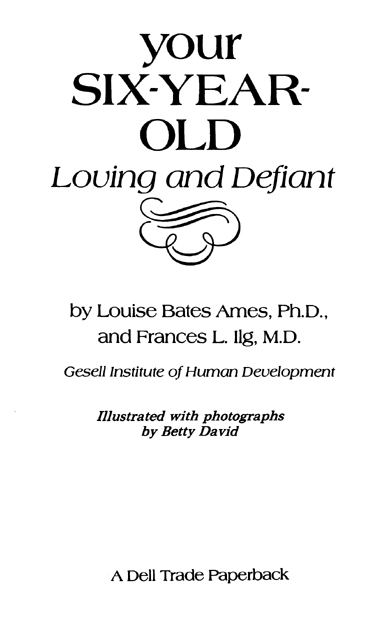A Dell Trade Paperback
Published by
Dell Publishing
a division of
Bantam Doubleday Dell Publishing Group, Inc.
1540 Broadway
New York, New York 10036
Copyright 1979 by The Gesell Institute of Child Development, Louise Bates Ames and Frances L. Ilg
All rights reserved. No part of this book may be reproduced or transmitted in any form or by any means, electronic or mechanical, including photocpying, recording, or by any information storage and retrieval system, without the written permission of the Publisher, except where permitted by law. For information address Delacorte Press, New York, New York.
The trademark Dell is registered in the U.S. Patent and Trademark Office.
eISBN: 978-0-307-80900-1
Reprinted by arrangement with Delacorte Press
v3.1
CAN
YOUR SIX-YEAR-OLD
MAKE YOU A HAPPIER, LESS STRESSED,
AND MORE EFFECTIVE PARENT?
YOU BET!
FIND OUT ABOUT
- The battling six-year-old it may be a shock to the parent of a once good-as-gold Five, but you can handle the difficult sixth year wisely if you know how. See .
- I hate you! hurtful words, temper tantrums, sudden tearsdiscover the secret of soothing a Sixs troubled heart. See .
- When company comes guests may bring out a Sixs worst behavior. Prepare ahead to turn a Dennis the Menace into a perfect little lady or gentleman. See .
- Pilfering and stealing no, you dont have a baby bandit, but most Sixes take things that dont belong to them. Find out what you absolutely have to do. See .
- Reading with ease a few simple techniques will boost your Six-year-olds skills and keep normal developmental problems from becoming a lifelong frustration. See pages .
- Right-brain/left-brain kids a childs personality and inborn talents may depend on which side of the brain dominates. But schools favor only one. Find out why. See . and more!
YOUR SIX-YEAR-OLD
I think [these books] are delightful and likely to capture the imagination of young parents enough to get them through these years. I think the books will be both a pleasure and support for many parents.
T. Berry Brazelton, M.D., author of Toddlers and Parents and Infants and Mothers
These are cheerful, optimistic books. I agree with just about everything they say.
Lendon Smith, M.D., author of Feed Your Kids Right
CONTENTS
FOREWORD
Norms, or descriptions, of what a parent may expect his or her child to do at any given age make some people feel secure. They make other people anxious or even angry. But we have found that most parents do seem to find it comforting to know more or less what they may expect of their child at any given age.
Many find it especially comforting when their child is going through a difficult or demanding stage to learn that it is all very normalthat other children behave in these ways too.
We ourselves have been studying child behavior for the past forty years or more and our own studies were preceded by those of Dr. Arnold Gesell, the Director of our former Clinic at Yale, in whose honor our present Institute was founded.
All these studies, which have involved literally thousands of boys and girls, have convinced us that human behavior develops in a highly patterned way. It seems quite possible to describe rather clearly the more or less predictable stages through which any kind of behaviormotor, language, adaptive, personal-socialdevelops.
We can tell you with high confidence what the stages of development will be in the more or less average boy or girl.
But of course hardly anybody is truly average. As we shall describe in rather great detail in Chapter Nine of this book, every child is an individual, different in many ways from every other child livingeven from his or her own identical twin.
So when we tell you that Four is wild and wonderful, Five is calm and serene, Six something else again, this does not mean that all children at any one of these ages will behave or should behave just exactly in the ways we describe.
Some perfectly normal boys and girls will be ahead of our schedule. Some will be behind, and it is certainly not a cause for concern in either case. And then, of course, there are those who will hit it right on the nose.
Not only will there be many differences in timing, but also in level of equilibrium or disequilibrium. Some children at all ages are charmingly well adjusted, easy to live with. Others, no matter how skillful and caring their parents, may be difficult at any stage of childhood, or at all.
Some children seem to develop in a fairly integrated way. All the different kinds of behavior occur rather evenly. So, they will be right at, or above their age, or below their age in motor, adaptive, language and what we call personal-social behavior. Others may be way ahead of customary expectations in their talking but below age in motor ways. Or just the opposite.
We have described the kinds of individual differences we expect later in this book. But so that no reader will be made anxious by what we say, let us emphasize right here at the very beginning that the descriptions of expected behaviors which we give are only averages, generalizations, ways that many of the children we see do conduct themselves.
We have sometimes likened the descriptions we give in this and other similar books to a map of a country through which you may plan to travel. We can tell you what the country is like. We cannot tell you what your trip will be like. You may go faster or slower than the usual traveler. You may take more side excursions than the average. You may even at times backtrack. The map does not guarantee what you will do or even tell you what you ought to do. It merely defines the territory.
Most people find maps quite useful. Many parents find our maps of the terrain of child behavior useful, too. So use our maps if you like and we hope that you will find, as do many, that they provide helpful orientation. Please do not use them for comparing your own child with our hypothetical average and then making adverse judgments either about our norms or about your own child. Each child is a wonderfully unique and special person. We hope only to help you appreciate him more as he passes through his various stages of development.
chapter one CHARACTERISTICS OF THE AGE

Your typical Six-year-old is a paradoxical little person, and bipolarity is the name of his game. Whatever he does, he does the opposite just as readily. In fact, sometimes just the choice of some certain object or course of action immediately triggers an overpowering need for its opposite.
The Six-year-old is wonderfully complex and intriguing, but life can be complicated for him at times, and what he needs most in the world is parents who understand him. For Six is not just bigger and better than Five. He is almost entirely different. He is different because he is changing, and changing rapidly. Though many of the changes are for the goodhe is, obviously, growing more mature, more independent, more daring, more adventurousthis is not necessarily an easy time for the child.







